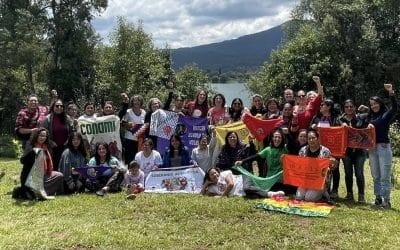Communiqué de presse par All India Forum of Forest Movements (AIFFM)
Le 13 février dernier, la Cour suprême de l’Inde, statuant sur une requête remontant à plus de dix ans qui remet en question la validité constitutionnelle de la loi de 2006 sur les droits forestiers, a ordonné que les habitants des forêts dont les demandes de reconnaissance des droits forestiers ont été rejetées, soient expulsés de manière sommaire et dans un délais déterminé. L’ordonnance contient les instructions afin que le gouvernement de chaque État veille à ce que ces expulsions soient dûment effectuées.
Continuez à lire en anglais …
We fail to understand how such an order could be possible. Not only would it lead to a concerted and fresh attack on millions of marginalised and already beleaguered forest dwellers of the country, but also seriously undermine the historic Forest Rights Act, a legislation whose implementation has continued to remain fraught ever since it came into force in 2008. In particular, in instructing the state governments to evict ‘forest dwellers’ in cases of rejected forest rights recognition claims, the top court of India chooses to ignore the centrality of Gram Sabha and its constitutional agency in all matters of forest rights recognition, including rejection of claims.
The top court of the country, instead of safeguarding FRA and rights of the forest dwellers, has come out with an order that effectively challenges its implementation. While doing so, the Court failed to take due cognizance of the relevant provisions of the law before passing the order.
The order bases itself of data on ‘rejected’ forest rights claims furnished by various state governments. The court observes if and wherever such rejections have ‘attained finality’, evictions must follow immediately. AIFFM would like to point out that the law in question contains no provision for ‘final rejection’ of a forest rights recognition claim. Moreover, the governments at the Center and states are fully aware that the implementation of FRA is at best a slipshod affair, and so far only a minuscule percentage of its potential has been realised, both in terms of ensuring justice for the forest communities of India and sustained conservation of India’s forests. This means that FRA is still being implemented and the process of recognition of forest rights is nowhere complete and ‘final’. The claims rejection data filed by the state governments as quoted in the order therefore can only be tentative and interim, if not entirely suspect.
It would be good to remember that the elaborate proceedural mechanism and safeguards regarding rejection of claims in the Forest Rights Rules as amended in 2012 had to be incorporated mainly because of innumerable reports of arbitrary and unjust rejection from all parts of India. Also, the Ministry of Tribal Affairs, Government of India, kept on issuing orders and guidelines, asking for review of the rejected claims. The clause 12A of the Forest Rights Rules stipulates, among other things, the following:
Claims approved by the Gram Sabha have to be sent back to it, in case of objections by Government agencies and others
In case of modification or rejection of a claim by the Gram Sabha as well as Sub-Divisional Level Committee, the claimants have to be informed and given sufficient time to appeal against the proposed modification/rejection
The Sub-Divisional and District Committee could not take any decision on objections to any claim, without hearing the claimant
No petition of the aggrieved person shall be disposed of, without giving her ‘a reasonable opportunity’ to present anything in support of his claim.
In cases where the resolution passed by the Gram Sabha, recommending a claim is upheld by the Sub-Divisional Level Committee with or without, without modifications, but turned down by the District Level Committee, the District Level Committee shall record detailed reasons for not accepting the recommendations of the Gram Sabha or the Sub-Divisional Level Committee in writing, and a copy of the order of the District Level Committee along with the reasons shall be made available to the claimant or the Gram Sabha or the Community.
Rule 12A also clearly states that “no committee (except the Gram Sabha or the Forest Rights Committee) at the Block or Panchayat or forest beat or range level, or any individual officer of any rank shall be empowered to receive claims or reject, modify, or decide any claim on forest rights.”
It is hard to believe that the Supreme Court of India is not sufficiently aware of the provisions of the law. Therefore, we all want to know whether, before passing the present order, the Court has verified if the ‘rejections’ mentioned in its order are at all legal; if the claimants were given notice in writing and time to file petitions in all the cases, if the claims were sent back to the concerned Gram Sabhas for fresh scrutiny and finally, if the causes of rejection at the District Level Committees were duly recorded.
Information and experiences from the ground indicate that usually claims have been rejected at the behest of forest officials, or because of lack of particular types of evidences, such as proof for three generations’ residence in case of a large number of Other Traditional Forest Dwellers.
We therefore reject the illegal rejections and the figures presented in the present order. A process marked by blatant disregard of law and deliberate mischief making by interested parties cannot lead to justice, and we appeal to the Supreme Court to review its order urgently.
We do not however find it shocking that the Government of India didn’t bother to defend one of its flagship acts in the Supreme Court. The present NDA government has long since been trying to dilute or if possible scuttle the FRA. In the vast forest hinterland of India, adivasis and other forest communities keep on using the law to defend their dignity, culture, sovereignty and livelihoods, to prevent so-called development projects which benefit a handful of rich corporations but destroy people and their environments.
It’s in the interest of the present Government and its corporate allies that FRA is challenged, diluted, scrapped. It’s also in the interest of a handful of dubious conservation NGOs who believe in an archaic model of dehumanized fortress conservation, where forest people are seen as enemies of wildlife, but not big tourism and rampant, unbridled diversion of forests by state and corporates.
The people, the true custodians of India’s forests, on the other hand promise to defend FRA, the law which has turned into a site of struggle.
We appeal to all movement groups in India and elsewhere for solidarity and support. We also appeal to the political society of India for urgent support–please mount pressure on the centre as well as the states to intervene in this matter.
Let us defend India’s forests and forest peoples. Defend FRA.
Contact:
Devjit Nandi (942411145), Pravin Mote (937392823), Lal Sing Bhujel (8016585977)
All India Forum of Forest Movements (AIFFM)




